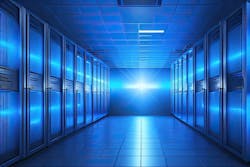Reports: “Tsunami” of AI Demand Drives Record Data Center Leasing
Data Center Frontier Editor-in-Chief Matt Vincent contributed to this story.
Huge interest in artificial intelligence (AI) is driving a land grab for data center real estate. Research firms report a major surge in data center leasing, exceeding even the peak demand during the COVID-19 pandemic.
The leasing spree is led by hyperscale operators placing huge bets on AI, who want to ensure access to data center space to house power-hungry server hardware for new generative AI applications.
Reports from research firm datacenterHawk and investment firm TD Cowen found data center leasing at record levels, as cloud providers look to secure capacity for AI workloads.
- datacenterHawk reported 835.6 megawatts (MW) of absorption in North America in the second quarter of 2022, a record for a single quarter.
- TD Cowen says its analysis finds "a tsunami of AI demand," with 2.1 gigawatts - that’s 2,100 MW - of data center leases signed in the last 90 days.
Although the two reports differ in their estimates of total leasing, they agree on the AI-driven surge in demand, even as the data center market struggles with delivery timelines due to power constraints and supply chain instability.
“There's still such a strong demand appetite out there, despite the headwinds that we see,” said David Liggitt, CEO of datacenterHawk. “It's a strong sign for our industry that demand is here, and I don't see it going anywhere.”
The TD Cowen report found that "hyperscale demand for data centers has re-rated materially higher over the past three months."
Significantly, the hyperscale deals are getting much larger, continuing the “super-sizing” of data center buildings and campuses.
These huge requirements arrive at a moment when vacancy rates for data center space are at a historic low of 3.16% in North America, according to datacenterHawk, with just 285 MW of available power.
Why is there such a large difference in the absorption numbers? We often see variances in leasing in data center market reports, which usually reflects different methodologies. In this case, the measurement gap is tied to ROFRs – rights of first refusal for future capacity, which allow a deal to be expanded over time. datacenterHawk does not include ROFRs in its data, while TD Cowen does.
Enterprise Customers Face Capacity Squeeze
There have been spectacular advances in AI over the past year, especially for generative AI applications that captured the public imagination by using short text queries to create images, answer questions, write essays, compose poetry, and accelerate software programming.
The rise of artificial intelligence has been enabled by hardware and data centers, and increased adoption of AI will require more compute capacity to support all that additional data crunching.
The huge land grab by hyperscalers raises questions about the availability of wholesale data center space for enterprise requirements, a concern DCF outlined last year.
Many data center operators covet enterprise IT customers and can also get better returns by leasing to them. But cloud platforms have become the largest customers, and often seek to pre-lease entire data center buildings prior to the completion of construction.
The imbalance between supply and demand also means higher prices for the available space, especially when a developer can offer several years of runway for deployment.
"Operators with capacity coming online in less than 24 months can charge a premium for their capacity," TD Cowen wrote. "This in our view reflects the growing scarcity of data center capacity as hyperscalers look to secure their access to future compute … This scarcity is also reflected in enterprise behavior as the growing requirements of hyperscalers have increasingly crowded enterprises out of the data center market."
TD Cowen said its checks “indicate that enterprises have started pre-leasing capacity up to six months ahead of facility delivery, an approach that we have not seen historically."
Both research firms discussed the rise of specialized infrastructure firms like Coreweave, which are absorbing meaningful amounts of data center space as they scale up their AI processing capacity.
Power Constraints Are a Growing Challenge
CBRE recently reported that a worldwide shortage of available power is inhibiting growth of the global data center market, and that sourcing enough power is of top priority among data center operators across the key global regions. This trend positions secondary markets with robust power supplies to attract more data center operators.
Both of this week’s reports affirm this finding, with Atlanta and Charlotte emerging as markets seeing growth.
“Limited supply, coupled with AI training deployments being less location/latency sensitive than cloud deployments, has led to the rise of what we call the 'anywhere' deal," wrote TD Cowen, noting that some companies with AI requirements will seek capacity wherever it is available.
Liggitt said the data center industry also faces stiff competition in the search for powered real estate.
“There's other there's other real estate asset classes that are really competing with the data center space, including industrial developers,” Liggitt said in datacenterHawk’s 2Q forecast. “Those developers typically move faster than the data center developers, just because there’s a lot less capital going into those type of requirement, so there's most likely less due diligence.”
Liggitt said industrial developers have been expanding rapidly in the Elliott Road Technology Corridor in Mesa, a Phoenix suburb that has also been a focal point for data center development.
The latest data points reinforce the top two trends cited in the DCF 2023 Forecast:
- Supply and Demand Meets Constraints and Delays: “Data center space will be harder to find and could cost more, particularly in the second half of 2023.”
- Generative AI Tools Emerge as Game Changers: “More enterprises are seeking to harness AI to make their devices and services smarter, and that process will likely be accelerated by the excitement around ChatGPT.”
About the Author



